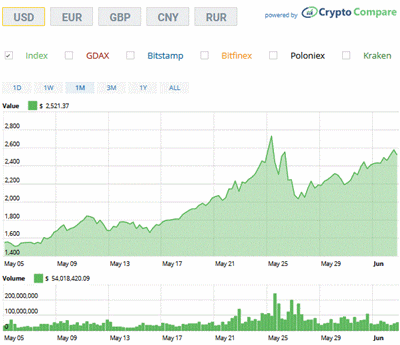Last month's post about April was crazy, but this month's post is even crazier.
I could also have summarized the month with a couple of keyword nouns: high, $2000; or keyword verbs: soar, spike, surge. After that, the most prevalent keyword was something completely different: ransom, as in:-
- 2017-05-15: Hardly Anyone Paying the Hackers? Because Using Bitcoin Is Hard (bloomberg.com)
After the ransomware began infecting users on Friday, they were given 72 hours to pay $300 in bitcoin -- chosen by the hackers because the crypto currency is harder to track than conventional payments -- or pay twice as much. If they refused to pay after seven days, their computer would be permanently locked -- a serious problem for those who haven’t backed up their data.
As of early Monday, only about $50,000 had been paid in ransoms, according to Elliptic Enterprises Ltd., a London-based company that tracks illicit use of bitcoin. The company calculated the total based on payments tracked to bitcoin addresses specified in the ransom demands, adding that it expects the total to rise.
More details emerged in the following days.
- 2017-05-16: Massive cryptocurrency botnet used leaked NSA exploits weeks before Wanna Decryptor (arstechnica.co.uk; also 'WannaCry') • 'On Friday, ransomware called Wanna Decryptor or WannaCry used leaked hacking tools stolen from the National Security Agency to attack an estimated 200,000 computers in 150 countries. On Monday, researchers said the same weapons-grade attack kit was used in a much earlier and possibly larger-scale hack that made infected computers part of a botnet that mined cryptocurrency.'
- 2017-05-16: From Kill Switch To Bitcoin, 'WannaCry' Showing Signs Of Amateur Flaws
The WannaCry infection was preceded by another wannabe-rich-quick criminal scheme:-
- 2017-05-07: Bitcoin Ransomware Education – AutoDecrypt (themerkle.com) • 'The number of different types of bitcoin ransomware continues to grow at an alarming rate. Earlier this week, security experts have come across a new strain that goes by the name of AutoDecrypt. Contrary to what people may believe by looking at the name, this malware will not automatically decrypt itself unless a payment is made.'
Unfortunately, this wasn't the last time we'll be confronted by this problem, partly because of another recurring keyword that appeared in different contexts: mainstream.
- 2017-05-22: Bitcoin Is Going Mainstream, but Its Current Run-Up Has a Speculative Feel (thestreet.com) • 'Bitcoin has largely failed as a mode of payment for consumer transactions, with many of the retailers that embraced it a few years ago having backtracked and the rest (from all signs) mostly seeing limited bitcoin transaction volumes. What the predictions of bitcoin's death didn't foresee, however, was the degree to which it would be embraced as an alternative to precious metals as a safe haven for those worried about things like inflation, political instability and (in certain countries) the security of assets held in traditional currencies.'
- 2017-05-24: Bitcoin is up over 400% in the past year—what’s stopping it from going mainstream? (marketwatch.com) • Abigail Johnson [CEO of Fidelity Investments] says bitcoin is grappling with technological and regulatory issues, as well as what to use it for in the first place.
- 2017-05-27: From Bitcoin to Big Business, Blockchain Technology Goes Mainstream (voanews.com) • 'The technology behind bitcoin and other cryptocurrencies is being looked at by more conventional companies and businesses'
Soar, spike, surge; ransom; mainstream. These keywords are all linked by more than bitcoin.
